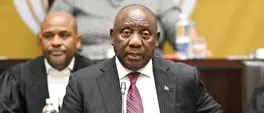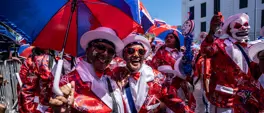ANCYL's Malatji calls on party in WC to be a more active opposition
Lindsay Dentlinger
10 January 2025 | 11:15Collen Malatji said that the ANC in the Western Cape needed to be more vigorous in exposing the polar opposite living conditions of Cape Town's townships and the inner city.
CAPE TOWN - African National Congress Youth League (ANCYL) president, Collen Malatji has called on the party to be a more active opposition in the Western Cape.
He said that the party's supporters had stopped voting for the party in the province because they'd given up on the promise of a second economic revolution.
Malatji said that the future of the ANC's renewal lies with its women's league and believes it's ready to produce a leader for the party.
The ANC's national executive have been meeting with supporters across the province this week in preparation for the delivery of its January 8th statement in Khayelitsha on Friday to commemorate its 113th anniversary.
READ: Ramaphosa claims ANC experiencing ‘resurgence’ of support despite electoral decline
The ANCYL president said that the ANC in the Western Cape needed to be more vigorous in exposing the polar opposite living conditions of Cape Town's townships and the inner city.
The Democratic Alliance (DA) has been in control of the city since 2006.
"Our farmworkers are every day exploited, paid nothing by the DA-led government and the DA's sponsors here in the Western Cape but the ANC can't keep quiet when such happens."
Malatji said that unemployment was fueling violence against women and children.
"Enough is enough. The economy of this country must be deliberately structured to benefit the majority of South Africans. There can't be two people who are living in one country but others are living in Khayelitsha in poverty, others are living way better in Cape Town."
Malatji said that the next revolution must be led by women who were the most reliable, organised and focused and who had proven they would never sell-out the movement when people are in need.
Get the whole picture 💡
Take a look at the topic timeline for all related articles.















